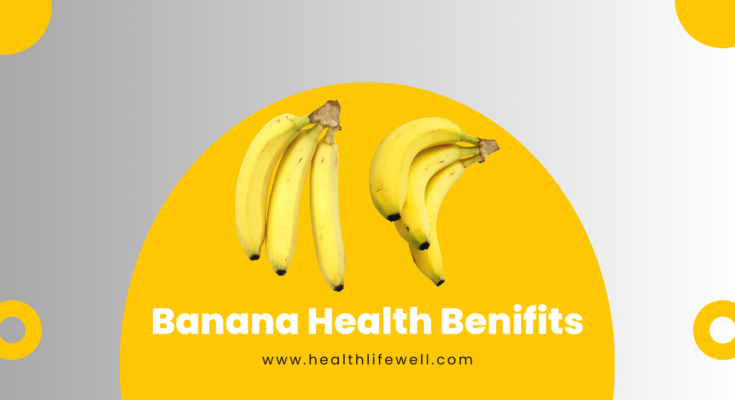Bananas are one of the most widely consumed fruits globally, renowned for their sweetness, convenience, and numerous health benefits. They grow on large herbaceous plants and are technically classified as berries. The most common variety is the Cavendish banana, but there are many other types, including plantains, which are larger and starchier. Bananas are not just tasty but also very good for you. You can eat them as a quick snack or add them to your meals. These fruits from the tropics have many health benefits. Let’s look at some of them:
Certainly! Here are Ten science-based health benefits of bananas:
1. Rich in Nutrients
Bananas contain essential vitamins and minerals and fiber, including vitamin C, vitamin B6, potassium, and magnesium.
- Carbs, Fiber, and Antioxidants: Bananas provide a good amount of carbs, water, and dietary fiber. They’re low in fat and protein but high in essential nutrients.
- Key Vitamins and Minerals: A medium-sized banana contains:
- Vitamin C: Boosts your immune system.
- Vitamin B6: Supports brain health and metabolism.
- Potassium: Helps regulate blood pressure and fluid balance.
- Magnesium: Essential for muscle function and bone health.
2. Blood Sugar Regulation
The soluble fiber in bananas helps stabilize blood sugar levels, making them suitable for most people, especially those without diabetes.
- Soluble Fiber: Bananas are rich in soluble fiber, which forms a gel during digestion. This helps stabilize blood sugar levels and prevents spikes.
- Resistant Starch: Unripe bananas contain resistant starch, which further aids blood sugar control.
3. Digestive Health
The dietary fiber in bananas helps to regulate bowel movements, prevent constipation, and promote a healthy digestive tract. The soluble fiber, particularly pectin, can also help to manage diarrhea by absorbing excess water. The latter acts as a prebiotic, supporting beneficial gut bacteria
- Prebiotic Properties: The resistant starch in unripe bananas acts as a prebiotic, feeding beneficial gut bacteria.
- Pectin: Found in both ripe and unripe bananas, pectin supports regular bowel movements and may protect against colon cancer.
4. Weight Management
While no direct studies link bananas to weight loss, their fiber content and low-calorie profile make them a smart choice for satisfying hunger.
5. Cardiovascular Health
The high potassium content in bananas helps to balance sodium levels in the body, which is important for maintaining healthy blood pressure. Regular consumption can reduce the risk of stroke and heart disease.
6. Mood and Cognitive Function
Bananas contain tryptophan, an amino acid that the body converts into serotonin, a neurotransmitter that helps improve mood and promote relaxation. This can be beneficial for mental health and stress management.
7. Bone Health
While not high in calcium, bananas can contribute to bone health by enhancing the absorption of calcium from other foods due to their potassium and magnesium content.
8. Energy and Recovery
The natural sugars in bananas provide a quick energy boost, making them an excellent choice for athletes or those needing a mid-day pick-me-up. They also help replenish glycogen stores in muscles after exercise.
9. Energy and Recovery
The natural sugars in bananas provide a quick energy boost, making them an excellent choice for athletes or those needing a mid-day pick-me-up. They also help replenish glycogen stores in muscles after exercise.
10. Kidney Health
Potassium in bananas supports kidney function by reducing the risk of kidney stones and maintaining proper fluid balance in the body.
Culinary Uses
Raw Consumption: Bananas are often eaten on their own as a convenient snack.
Smoothies: They add natural sweetness and creaminess to smoothies.
Baking: Mashed bananas are used in recipes for bread, muffins, and pancakes to add moisture and flavor.
Savory Dishes: Plantains, a type of banana, are used in various savory dishes, particularly in Latin American and African cuisines.
Conclusion
Bananas are not just a convenient and tasty fruit but also offer a range of health benefits due to their rich nutritional content. They support digestion, cardiovascular health, energy levels, and overall well-being, making them a valuable addition to a balanced diet. Whether eaten raw, used in cooking, or added to various recipes, bananas are a versatile and nutritious food choice.
Remember, moderation is key. Enjoy one or two small bananas regularly, and savor the natural goodness they offer!


